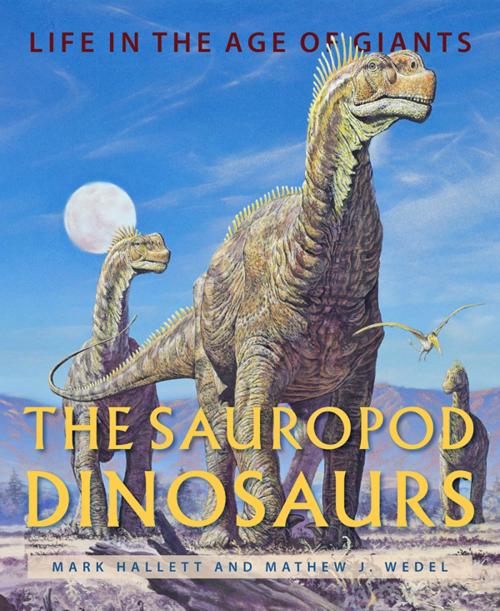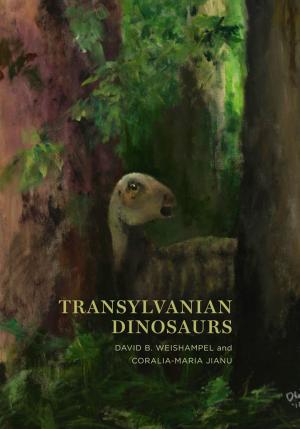The Sauropod Dinosaurs
Life in the Age of Giants
Nonfiction, Science & Nature, Nature, Animals, Dinosaurs, Science, Biological Sciences, Biology| Author: | Mark Hallett, Mathew J. Wedel | ISBN: | 9781421420295 |
| Publisher: | Johns Hopkins University Press | Publication: | November 1, 2016 |
| Imprint: | Language: | English |
| Author: | Mark Hallett, Mathew J. Wedel |
| ISBN: | 9781421420295 |
| Publisher: | Johns Hopkins University Press |
| Publication: | November 1, 2016 |
| Imprint: | |
| Language: | English |
From The Land Before Time to Jurassic Park, images of fantastically large, long-necked, plant-eating dinosaurs have captured our imaginations. These are the sauropods: centerpieces of museums and gentle giants of the distant past. Imagine what it must have been like to crest a hill and see in the valley below not just one sauropod, but an entire herd, feeding its way across the landscape.
The most massive land animals ever to have lived, sauropods roamed widely across the continents through most of the "Age of Dinosaurs" from about 220 to 65 million years ago. They reached incredible sizes, giving rise to the question: Why were they so big? Early guesses suggested that they gained protection from predators by virtue of their size, which also allowed them to reach the tops of trees in order to eat leaves and conifer needles. More recent hypotheses hold that they needed a long and complicated digestive tract due to their consumption of low-nutrient food sources: size was an offshoot of that need. Whatever the explanation, there is little doubt that natural selection produced something extraordinary when the Sauropoda diversified into a wide variety of species.
This book combines majestic artwork and the best of paleontological research to resurrect the lives of sauropods. The Sauropod Dinosaurs shows how these amazing creatures raised and defended their young, traveled in groups, and interacted with the rich diversity of Mesozoic plants and animals. Beautiful enough to sit on the coffee table, the book also serves as the best reference available on these bygone giants. Anyone with a passion for dinosaurs or prehistoric life will cherish this once-in-a-generation masterpiece.
The book includes the following features:
Over 200 full-color illustrations
More than 100 color photographs from museums, field sites, and collections around the world
Thoughtfully placed drawings and charts
Clearly written text reviewed by major sauropod researchers
Descriptions of the latest sauropod concepts and discoveries
A field guide to major groups of sauropods
Detailed skeletal reconstructions and anatomical restorations
A comprehensive glossary
From The Land Before Time to Jurassic Park, images of fantastically large, long-necked, plant-eating dinosaurs have captured our imaginations. These are the sauropods: centerpieces of museums and gentle giants of the distant past. Imagine what it must have been like to crest a hill and see in the valley below not just one sauropod, but an entire herd, feeding its way across the landscape.
The most massive land animals ever to have lived, sauropods roamed widely across the continents through most of the "Age of Dinosaurs" from about 220 to 65 million years ago. They reached incredible sizes, giving rise to the question: Why were they so big? Early guesses suggested that they gained protection from predators by virtue of their size, which also allowed them to reach the tops of trees in order to eat leaves and conifer needles. More recent hypotheses hold that they needed a long and complicated digestive tract due to their consumption of low-nutrient food sources: size was an offshoot of that need. Whatever the explanation, there is little doubt that natural selection produced something extraordinary when the Sauropoda diversified into a wide variety of species.
This book combines majestic artwork and the best of paleontological research to resurrect the lives of sauropods. The Sauropod Dinosaurs shows how these amazing creatures raised and defended their young, traveled in groups, and interacted with the rich diversity of Mesozoic plants and animals. Beautiful enough to sit on the coffee table, the book also serves as the best reference available on these bygone giants. Anyone with a passion for dinosaurs or prehistoric life will cherish this once-in-a-generation masterpiece.
The book includes the following features:
Over 200 full-color illustrations
More than 100 color photographs from museums, field sites, and collections around the world
Thoughtfully placed drawings and charts
Clearly written text reviewed by major sauropod researchers
Descriptions of the latest sauropod concepts and discoveries
A field guide to major groups of sauropods
Detailed skeletal reconstructions and anatomical restorations
A comprehensive glossary















